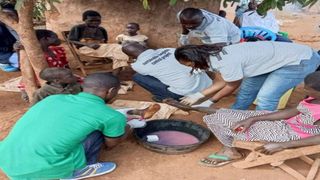
Some staff of the Sustainable Tungiasis Control Project and Village Health Team officials work on residents infested with jiggers in Bugiri District during an outreach last week. PHOTO/ABUBAKER KIRUNDA
|National
Prime
Bugiri battles jigger outbreak
What you need to know:
- The Bugiri Rotary Club has secured at least Shs430m to help in elimination of jiggers in the district, according to the club president, Mr Azalwa Malijani.
At least 2,000 residents of Bugiri in Busoga Sub-region are said to be infested with jiggers, the District Health Officer has said.
Dr Stephen Kirya said the problem is rampant in the sub-counties of Bulesa, Budaya, Muterere, Nankoma, Buwunga and part of Bulidha.
“It’s true that jiggers are currently a (big) problem, but it is not a threat compared to other infections such as Covid-19,’’ Dr Kirya said in an interview at the weekend.
He added that the jiggers have also infested pigs and dogs.
“Jiggers survive in a dirty environment with brown soils, and all the areas I have mentioned are experiencing this; so, the locals are prone to being infected by the jiggers,” Dr Kirya said.
He said the most vulnerable are children between the ages of one and six, and the elderly.
Symptoms and treatment
Dr Kirya said a person infected with jiggers becomes anaemic, scratches the affected body parts and experiences fever.
He, however, said the patient can be helped through medication that increases the amount of blood in the body, or by popping the jigger out of the body and treating fever using antimalarial drugs.
According to Dr Kirya, mass elimination of jiggers from the communities can be done through ensuring cleanliness in homes, and avoiding sharing space with domestic animals.
The Bugiri Rotary Club has secured at least Shs430m to help in elimination of jiggers in the district, according to the club president, Mr Azalwa Malijani.
Mr Malijani said Rotarians from Germany donated the money, while Makerere University carried out the survey that established that jiggers were becoming a problem in Bugiri.
“The research findings provided the basis for funding towards elimination of the blood-sucking insects,” Mr Malijani said, adding that a two-year project to fight jiggers, code-named ‘Sustainable Tungiasis Control’, has been launched.
Mr Malijani said the money would purchase medicines, including those to fumigate homes and domestic animals, salaries for five staff and for mobilising communities to embrace the best health practices.
The project officer, Ms Sarah Nakivumbi Katwere, said implementation of the project started yesterday with training of Village Health Team members, who will identify the infected persons from their respective homes.
She said more than 10 patients are expected to be treated daily.
“We have planned to treat between three and 15 residents infected with jiggers per day, and hope to cover every area within the district,’’ Ms Nakivumbi said.
A parent, who preferred anonymity, said two of his children have dropped out of school due to jiggers.
He said besides failing to walk due to pain, the children are stigmatised at school.




